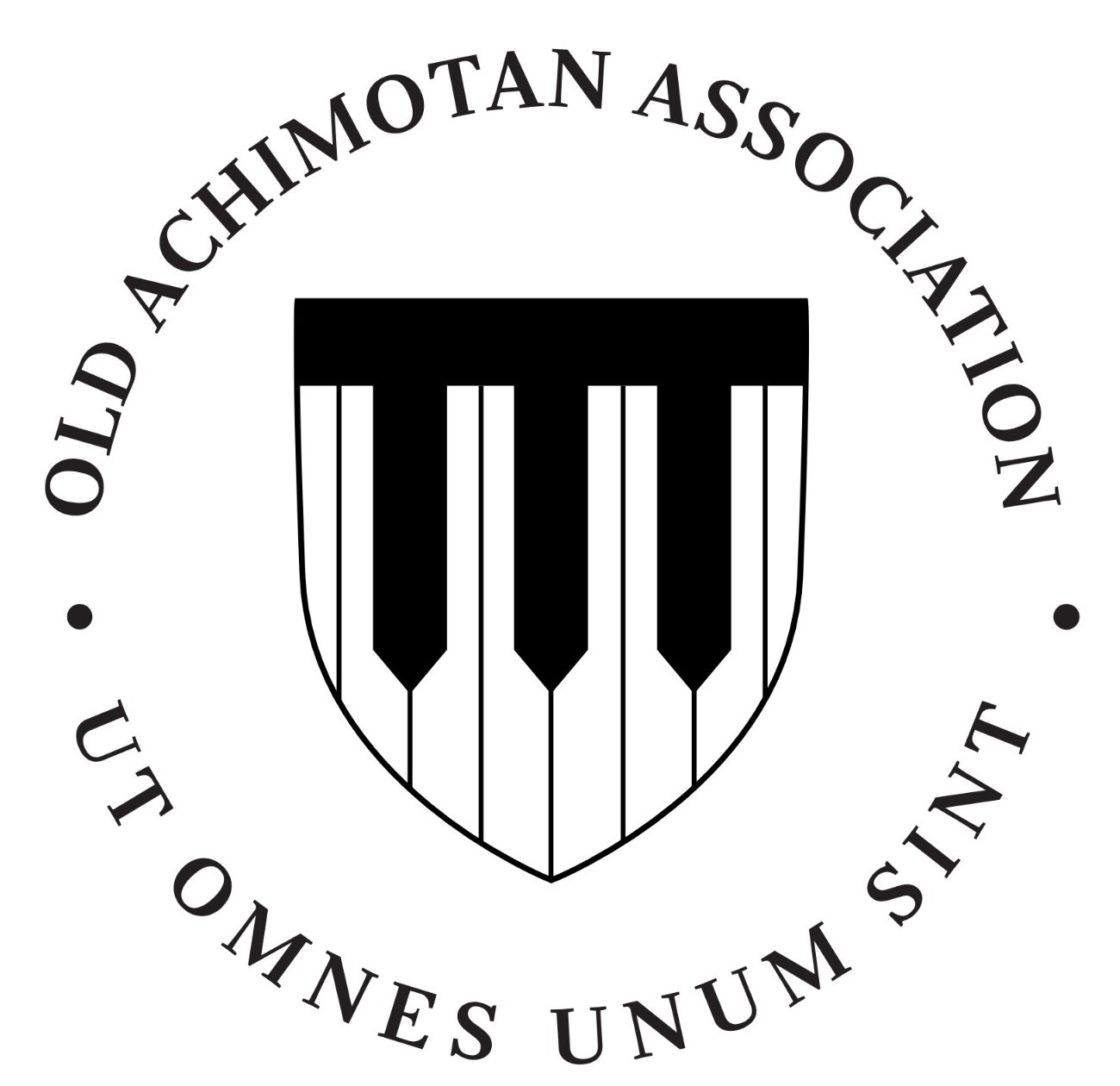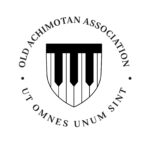Alumni stories
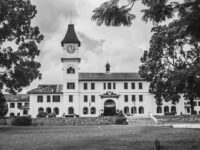
My Association with Dr. Letitia E. Obeng, Emeritus Professor Samuel Ofosu-Amaah and Professor Edward Ayensu: The Achimotan Connection ; Nana S.K.B. Asante
When I won an Achimota school scholarship in 1945, my elated mother, Obaapanin Yaa Awisi, jubilated through the main street of Asokore proclaiming in Twi that “they are sending my son to “aburokyiri” (overseas)”. When I pointed out to her patronisingly that Achimota was only a few miles from Accra, her prophetic answer silenced me. She replied that she knew that Achimota was near Accra but insisted that it had been stipulated in my letter of admission to Achimota that I would be sent to aburokyiri for further studies on completing my secondary education at Achimota. I saw no such stipulation in the letter and my mother, though skilled in the retail business, was unlettered.
In 1953, my old lady triumphantly declared that she had been vindicated just before my departure for law school in the UK and on government scholarship. I am telling this story because in a very graphic way, Achimota did serve as a gateway to an unknown wide world.
In 1945, when my mother made her inspired prediction, there were no more than a dozen secondary schools in the Gold Coast, and none in the northern sector, i.e. Ashanti (including Brong Ahafo) and the Northern Territories. There was no university in the entire country. There were probably no more than 100 university graduates. Government scholarships for degrees and professional training in UK were few and far between and none was available for law.
There was no concept of international public service because the Gold Coast was a colony, and its citizens were not eligible for international appointments.
I met the three eminent departed colleagues at Achimota well before the Gold Coast attained independence, when we had very unclear ideas about our respective professional careers after Achimota.
The story about my association with our distinguished colleagues, to some extent, chronicles the unfolding of an entirely new world into which we were ushered by Achimota and the momentous historical developments after we became Akoras.
In my “Critical and Biographical Essays of Nana S.K.B. Asante: From an African Village to the Global Village and Back”, I recount my journey from my village to the international service and my global encounters. But an interesting feature of my journey from rural Ashanti was my exposure to social interaction with numerous Ghanaians of diverse backgrounds through the Achimotan connection.
Achimota provided the beginnings of my association with Letitia Obeng from Anum, Samuel Ofosu-Amaah from Accra and Bosome and Eddie Ayensu from Secondi.
I first met Auntie Letitia Obeng (neé Asihene) as the highly accomplished “Big Sis” of my Achimota classmate Kwadwo Asihene in 1946, our first year, when she had already graduated with an Intermediate BSC from the Intermediate Department of Achimota College.
Her fiancée, George Obeng, was my compassionate teacher in the Arts and Crafts Department.
I lived in Cadbury House with Samuel Ofosu-Amaah at Achimota from 1948 to 1949. He was my senior by one year and belonged to the Achimota class of 1949. His younger brother, George, was admitted to Achimota in 1949, but was not a member of Cadbury House. George, the former Dean of the Law Faculty at Legon, became a close personal friend as did the younger and highly distinguished brother Paa Tii, former Vice President and Secretary of the World Bank.
Edward Ayensu was my junior by a few years at Achimota. Although he did not live in Cadbury House, I met him quite often during his visits to his brother Cromwell with whom I shared a dormitory.
We all left Achimota and pursued our respective educational and professional careers in the Gold Coast, the UK and USA. But my connection with them persisted in unexpected circumstances after Achimota.
I met Eddie Ayensu again in Washington DC. from 1966 to 1969, when I was an attorney with the World Bank while Eddie served as a director of the Smithsonian Institution. Eddie was a prominent personality in Ghanaian professional circles in the American capital and we interacted often on social occasions. His affability was magnetic. His wife, Dinah, achieved prominence with the publication of a book on Ghanaian cooking.
After my tenure with the World Bank, our paths crossed from time to time due to our common interests in various aspects of the acquisition of technology by developing countries. We finally met again under the auspices of the Ghana Academy of Arts and Sciences after our retirement from international service. During my presidency of the Academy, Eddie used his good offices to arrange for a major collaboration between the Academy and the World Bank Inspection Panel, where Eddie was a former Chairman. This resulted in a very successful joint seminar at Accra in the early 2000s on the environment.
Eddie originally specialised in Botany, but he excelled in other fields. I recall the launch of his book on Ashanti Gold at PAWA and my appearance as one of the resource persons at that event.
My post Achimota contacts with Sam Ofosu-Amaah were sporadic, often through my social interaction with his brother George. We saw quite a bit of each other during our days as UN officials in New York in the 1980s and early 1990s. Sam, after his specialisation in paediatrics, had become an international guru in public health. He served the UN together with his wife, Virginia, a UN expert in her own right.
However, our relationship deepened in our post-retirement years as Fellows of the Ghana Academy of Arts and Sciences and as members of the inaugural Governing Council of the Ghana College of Physicians and Surgeons. Sam and I were, in fact, Vice Presidents of the Academy during the presidency of Professor Fred Sai. He presided over the science section, while I was VP (Arts). Furthermore, I had the honour of chairing his delivery of J.B. Danquah Memorial Lectures in 2003 on the topic “Health and Disease in Ghana: The Origins of Disease and the Future of Our Health”. His introductory words in this lecture disclosed that as a man of science, he was also a man of faith.
Sam was the inaugural President of the Ghana College of Physicians and Surgeons, which is celebrating its 20th anniversary this year. His imaginative leadership and formidable intellectual prowess led to the successful establishment of the first and only facility for postgraduate medical training in Ghana. I was privileged to serve with him as a member of the Governing Council of the College for the first five years. We also belonged to the Ghana Association of Former International Civil Servants.
After Achimota, I had little contact with Auntie Letitia until we relocated to Ghana from our respective international engagements and became neighbours in Accra. She had served as Director of the UN Environmental Protection Agency for Africa and although my work at the United Nations Centre on Transnational Corporations in New York traversed environmental issues involving transnational corporations, we did not meet until the annual dinner of the Ghana Academy of Art in Sciences in December 1996. Thereafter, our frequent encounters under the auspices of the Academy developed into a close personal friendship and intellectual collaboration. We served together on the Council of the Academy for a number of years. She invited me to chair the launch of her book on Parasites and to write the Foreword to her fascinating autobiography subtitled “A Silent Heritage.” Auntie Letitia honoured me with a delightful poem on my 70th birthday and contributed a chapter to my Festschrift.
I had the distinct privilege and pleasure of handing over the baton of the Presidency of the Ghana Academy of Arts and Sciences to her in January 2007.
I am struck by the similarities and parallels in the life stories of my three heroes. They were all Akoras and graduates in pure science or applied science. They served as distinguished international officials and were eminent Fellows of the Ghana Academy of Arts and Sciences.
A remarkable quality exhibited by the three colleagues is their versatility. Eddie Ayensu received a PhD in botany but became an authority on technology, environment and development. He was also a prolific and accomplished writer on such subjects as Ashanti Gold and the history of VRA. He was reputed to be a collector of valuable works of art.
Sam Ofosu-Amaah also had wide extra-extracurricular interests, including astronomy, history, particularly family trees and backroom politics. He represented the Medical and Dental Association in the Constituent Assembly that drafted the 1969 Constitution of Ghana.
Auntie Letitia specialised in Zoology, but her interests widened into the environment generally. Her literary prowess was legendary. She edited and completed her late brother’s book on the History of Arts in Ghana. Her autobiography contains gems of sociology, social anthropology and political and social history. She also wrote good poetry.
All three played prominent roles in the Ghana Academy of Arts and Sciences in various high offices and delivered flagship memorial lectures of the Academy.
My story does not pretend to be a full biographical portrayal of my esteemed colleagues. It only chronicles my connections with them. However, in this limited compass I hope I have revealed adequate evidence of their stature as icons not only in Ghana but in the world generally.
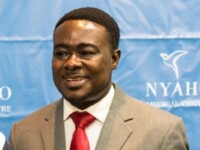
A past Vice President of the Ghana Medical Association (GMA), Dr Sodzi Sodzi-Tettey, has been elected to serve on the prestigious International Society for Quality in Healthcare (ISQua).
The Ireland-based society collaborates with a wide network of individuals and associations across the globe to improve the quality and safety of healthcare worldwide.
Dr Sodzi Sodzi-Tettey is currently the Executive Director and Head of the Africa Region of the Institute for Healthcare Improvement (IHI).
Before his election onto the Board of ISQua, he served as Assistant Editor of the ISQua Journal.
He is also a founding member of the International Academy of Quality and Safety, an institute that advances quality in healthcare delivery throughout the world through professionalism.
His new appointment is touted as a testament of the contribution many young Africans make in improving the quality and safety of healthcare in Africa and across the world.
A public health physician, Dr Sodzi-Tettey also has years of clinical and management experiences in frontline district medical practice.
He has also conducted high-level training and short term consultancies in quality improvement with a number of organizations in Saudi Arabia, India, Ethiopia, Liberia, Nigeria and in the United States working with a diverse group of organisations like the World Health Organisation, Care India, Centre for Integrated Health Programmes, Nigeria, Kind Saud Medical City, Saudi Arabia, among others.
Dr Sodzi-Tettey told GhanaWeb that his mission as a member of the ISQua Board will be to promote scientific writing in Lower-Middle Income Countries (LMICs) by rolling out a Mentorship Model.
“I also intend to expand professional development opportunities for Africans and members from LMICs,” he said.
He said will promote diversity on ISQua’s Board and operations by creating space and amplifying the voices of underrepresented groups.
“I am humbled by the overwhelming support i got from colleagues globally, especially across Africa, Latin America, and the Middle East and from Europe and North America,” he said.
He added: “I wish to express sincere personal gratitude to Prof Sheila Leatherman from the US who gave me my first opportunity at ISQua at the 2012 conference in Geneva, Dr Emmanuel Aiyenigba from Nigeria, Dr Andrew Likaka from Malawi, Jacqui Stewart from South Africa, Prisca Atogsiyah from Ghana, Prof Ezequiel Garcia Elorrio from Argentina, Dr Wafa Allouche from Tunisia and Dr. Peter Lachman from South Africa without whom this feat would have remained but a dream.”
Source www.ghanaweb.com
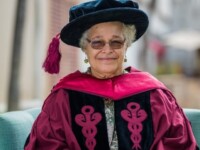
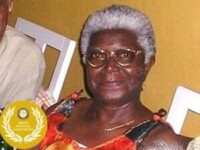
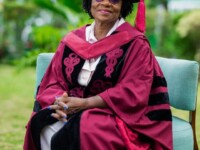
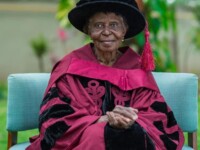
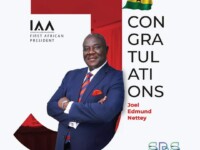

Congratulations Akora Anna A.O. Obeng ‘79. Promoted to the rank of Deputy Chief Fire Officer Director in charge of Special Duties HQ
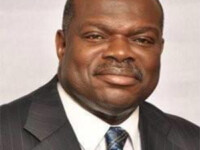
Did you know our OAA President used to run a nightclub at Sarbah Hall called Aboagyewaa Disco?
The former Vice-Chancellor of the University of Ghana, Professor Ernest Aryeetey has revealed that he ran a nightclub at a hall in the University of Ghana when he was a student there.
Professor Aryeetey said that he was a DJ at the Aboagyewaa nightclub at Mensah Sarbah Hall during his time there and made friends in the process.
He disclosed this in an interview with Y 107.9 FM’s Rev Erskine on the Y Leaderboard Series on the Myd Morning Radio Show.
“I used to run Aboagyewaa Disco at Sarbah Hall. I run it as a business and not for fun. I enjoyed it and made friends with my customers in the process.”
According to him, regardless of going to the university for free, that was what he did to get extra money for himself.
There was always support from my family. By the time I went to high school my dad had retired but he dedicated his pension to pay for my schooling at Achimota.”
He indicated that regardless of his dad being on retirement, he still received support from not only him but his elder brother and mum as well.
The educationist recalled a period in his school days where he made about GHC27.00 from a vacation job. “That took me about a month to finish it.”
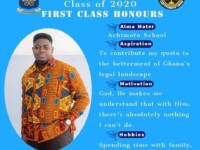
Congratulations to Akora Emmanuel Dei Tumi Jr of the 2016 Year Group for his accomplishments at University of Ghana School of Law Class of 2020
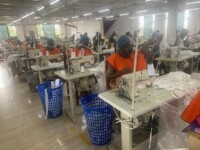
We celebrate Akora Adjo Dede Asare of the 2001 Year Group.
Akora Adjo is the CEO of Alfie Designs and a 2016 YALI Mandela Washington Fellow.
Ghana’s Ministry of Trade visited Alfie Designs factory in 2019 and saw what the company was doing for Ghana in terms of exports for the international market, factory space and its potential to expand and employ more people.
When COVID-19 emerged, Alfie Designs was selected to help manufacture *720,000 cotton nose masks,10,000 medical scrubs, 18,000 hospital gowns, and 18,000 head covers.*
We know how essential and vital these PPEs are to Health Workers fighting COVID-19.
Akora Adjo has brightened the corner where she is and has become living water to a thirsty land.
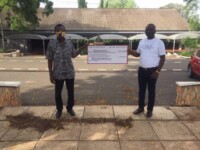
Akora Amma Prempeh of the 1996 Year Group launched her scholarship program called Prempeh On Three, with GHS1000.00 scholarships given out and presented to Achimota School on 18/5/2020. This will be awarded to 2 intelligent Achimota School students( science student & sports or basketball student) with financial need. The scholarship will be awarded yearly to Achimota School.
Achimota School (Ivy League school in Ghana) is known to have educated many great leaders in Africa and worldwide. Very intelligent students with financial challenges find it difficult to get in. It will be even harder for most of them to go to school after the lockdown is lifted in Ghana and I hope this scholarship will bring joy and hope to 2 students and with time I hope to be financially able to reach more. I am happy that I was able to help the School on this when I was contacted and given the opportunity to help.
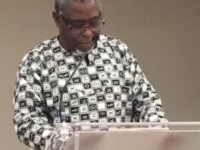
Another note on Atsiiimota the excellent school of our time!
Ade Sawyerr at Remembrance Service in London – 5th November 2017
Some 51 years ago, I entered Atsiiimota School, the Grey City on the Outlaws Hill, as a fresh-faced ’Nino’ boy. In those days this great Shool was situated miles away from Ga as we knew it then, bordering on the fringes of the city of Accra.
Tales are told of a strange and forlorn place, home to wandering spirits; a place, the name of which none dared to speak for fear of being confronted by the mysterious spirits – jemanwojii – that roamed about. It is said that many slaves were kept hidden away from the authorities after the abolition of the slave trade. A place that could only be referred to as Atsiiimota – This was part of the folklore that gave rise to one of the most difficult riddles, – Afoo taatso shi mifo ni miko which translated means “no one cuts the root of the sponge tree but I have done so and taken it away”. The response was Atsiiimota Odonkofoi or in English Atsiiimota, a place of slaves.
The only other time that I had been to the School was when I attended the selection interview which was conducted by the then headmaster Mr. Chapman Nyaho. I could hardly contain my excitement when I received my letter of admission; the school year had changed from January to September and I had done only 2 terms in Class 6. On 23 September 1960, about a month short of my 10th birthday, I arrived in a taxi accompanied by a cousin, Kate Majorla Sawyerr, who was also in the School, with my trunk and chop box which I could barely balance on my head. I was assigned to Guggisberg House where I fortunate to have two older cousins, Ate Ofosu-Amaah and King Ghartey Mould and a couple of classmates from Experimental School, Teddy Konu and the late Ekow Awoonor, to help settle me in. And so it was that I was ‘protected’ from the usual bullying that is meted out to all new students –Ninos.
My pocket money for the ten-week term was ten shillings, one shilling a week which I gave to the Housemaster Mr Pratt at the beginning of the term. From the one shilling, I could feast on dotch from Mrs Angbah, buy treats from Mr Doe’s Coke shop or sometimes from the Cadbury House Coke shop and still have change which I sometimes took to the Post Office down the road from G’berg House.
Atsiiiimota instilled in me the belief that l could succeed in anything I wanted to do, as long as I did not break any rules. There were about 10 school rules which had to be adhered to and I broke as many of them as I could get away with. My favourite school rule was the tenth one – Every breach of common sense is a breach of school rules. I caused an eleventh rule to be introduced; no cropping of hair right down to the skull. This, however, was not entirely my fault but mainly because my hair at that time grew at a fast rate and I had many a budding barber try to experiment with my hair which always went wrong.
The structured, regimented day began with the sound of the Rising Bell 5:30am followed by morning trotting before bath time. Students then had to make their beds; complete their chores in time for inspection by the Dormitory Monitor; some quiet time before finally setting off for morning service at the Aggrey Chapel; Oh, I forget that we had morning milk too. There were a couple of lessons before breakfast; more lessons mid-morning after snack time and still more lessons leading up to lunchtime.
After the afternoon siesta, there was games or groundwork depending on the season and then back to the bathroom; evening duties; dining hall again; prep and then soaking – light or heavy – common room and then lights out. We were fed so much that, not only did I put on weight but my I found myself growing much taller than the less than 4.10″ that I was before I entered the School.
This regime was only varied in the week by the early morning work at the school farm or at weekends which were less structured but for a notorious boy like me included many doses of project, fatigue, and detention and the very many table clearing duties that I was I think unfairly apportioned. Once a term we went on exeats.
The Atsiiimota of my time stood out for three things; excellent academic tutoring; a breadth of extracurricular activities and deep acculturation and socialization.
The academic work was excellent: what with teachers from all corners of the earth – from West Indies to Australia, from Seychelles to Wales, from Russia to the USA not forgetting our own Ghanaian nationals. The teachers were all excellent – Miss Helen Odamtten, Mr Gilbert, Mrs Hyde, Miss Saravanamutu, Mr Holt, Mr Laidlow, Mr Coates, Mr Cooke, Reverend Agbeti, Father Wild, Osofo Engmann etc etc. The School boasted a of a well-stocked library, a science block, a music school, an art school, a gymnasium, an athletics track, a cricket oval and swimming pool for extracurricular activities. Some subjects Geography, History, French, Bible knowledge, Science, and Ga were all new to me and as were the wider range of subjects like pottery, modelling, bookbinding, carpentry, and weaving. I struggled in my first year and for health reasons had to repeat my first year because I spent too much time in the hospital. I loved swimming but Mr Peter Renner monitored my time lest I came down with sickle-cell crisis.
The extensive range of extracurricular activities ensured that students were exposed to a full breadth of education that was second to none and which provided them with self-confidence. I joined the Boy Scouts and went camping up in the Shai Hills. No risk assessment was carried out and so I ended up being carried up the hills by our scout leader, Citizen Nii Laryea. I joined the Cadet Corps, participated in Independence Day celebrations at the Independence Square, and learnt among other things how to use a rifle, but was not brave enough to carry out a coup d’etat which the guy in the next bed successfully did. I also joined the Photographic Club and the tried my hands at acting in a play.
The Young Pioneers taught me lessons in leadership for life. The late Franklin Dove took me under his wing and encouraged me to teach at Sunday School at Anumle. Simply put, there was always something to do ensuring that the devil did not have any work for idle hands!
Without a shadow of a doubt, Atsiimota was unrivaled as a co-educational school in those days. We boys learned to comport ourselves around young ladies and in a more formal setting so as to smoothen the rough edges of the diamond within me. Social activities were super, the stories we told in the house, of friendships that have transcended the years. I never went to the gate, probably fancied myself as quite a handsome young chap but obviously, the ladies did not think so, so sadly, I entered Atsiiimota a boy though I would have liked to have said that it made a man of me, I still left a boy.
Nowhere else was culture celebrated as in Atsiiimota – with Philip Gbeho or Diana Quarshie Idun and Ms Tsibo, who could not find my voice tone on the piano keys, teaching songs and anthems to celebrate our Founders’ Day or Ian Hall setting the Psalm 150 into joyous kpanlogo music to praise God in His Firmament. Kofi Antubam was there in the Art School and you had to learn to draw people in cloth. Mr. Tagoe (you scondunfians) was out there in the weaving department and oh Mr Angbah, in the carpentry school. Where else was one likely to meet Kofi Ghanaba or Saka Acquaye icons of their time in the art and music scene in Ghana? Where else would one learn Edikanfo mo; Achinchi achinchi or Neyo amegbetor neyo nede, directly from Ephraim Amu. Where else would you see Mohamed Ali, filifili and W E B Dubois? How many schools could boast of a headmaster who had been our ambassador to the UN, Chapman Nyaho or a lecturer who whilst still a headmaster was appointed the minister of education, I K Chinebuah, who because of his Oxford accent we referred to as Comrade ChinaAbuah?.
Atsiiimota helped to form my character as a community-minded person and prepared me for the many careers that I would undertake in my working life. Atsiiimota spurred me on my thirst for knowledge even in inconsequential things and most likely as an activist seeing that I witnessed my first strike in the school against Rudwick who was then the assistant headmaster. Atsiiimota taught me humility and to respect my elders. My own father had attended the training college before taking on a job with the department of education after his degree and so many cousins from both sides of the family had gone on to Atsiiimota which perhaps was the reason why my father decided that it was the only school capable of giving me a first class and rounded education, enabling me to meet the best in Ghana during my formative years.
I made lifelong friends in Atsiiimota too numerous to name here. But today as we remember those that have passed before us let me recall a few of those who were close to me, Jean Amorkor Laryea, Ansafo Ofei, who passed when we were in Form 2, Frank Adu, Victor Bannerman, Agyarku Wiredu, Marcus Deku, Harold Nii Kpakpo Oti Ankrah, Kojo Lee, Philip Djan, Frank Nelson, Ekow Awoonor, Joel Hyde, John Nii Boye, Lauri Lawson, too many to name, Herman Plange and Dan Morton who passed on several years ago and were my mates at my old school and lately, Diana Konu nee Odjijah and Allotey Kofi Brown who entered Atsiiimota with me and who passed on last year and were buried within a day of each other.
May the good Lord grant them eternal peace and may we all stay blessed.
Atsiiimota remains a great school as we celebrate its 90th anniversary this year, and I wish to leave you with one of the verses from the School Hymn that in my view captures the spirit of the School
Then shall thy sons and daughters say, As back to thee they look with joy, It was there God gave us first to share The freedom of His grand employ.
Thank you for listening to me!
Ade Sawyerr, London November 2017
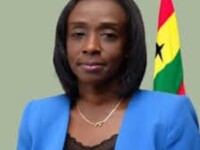
Akora Delese Mimi Darko (‘83)
Biography
Delese Mimi Darko was educated in Achimota Secondary School, Accra Halewood Grange in Liverpool and Oakdene School in Beaconsfield, England. She graduated with a B.Pharm (Hons) second upper class from the KNUST and has a Masters in business Administration from the University of Northampton. She is a pharmacist with over 25 years’ experience in regulation of medicines with respect to clinical trials regulation, marketing authorization and post-approval safety monitoring of medicines.
After graduating as a pharmacist in 1991, she did her National Service in the Police Hospital, Accra. She then worked with the then Pharmacy Board, specifically in the laboratory section, for seven years where she helped put in systems to ensure that both locally manufactured and imported drugs were analyzed for quality before they were put on the market. This was to ensure the protection of public health and safety.
In 1997, she was one of the pioneers of the newly established Food and Drugs Board, (FDB), which later became the Food and Drugs Authority (FDA) in 2012.
In 2005 and 2006 she was instrumental in the setting up of two technical advisory committees to assist the FDB/FDA in their work. These were the Technical Advisory Committee (TAC) on Pharmacovigilance and the Technical Advisory Committee on Clinical Trials, which comprise various renowned Ghanaians professionals with expertise in the varied fields of research, medicine and pharmacy from all around the country.
She rose through the ranks of the FDB/FDA to become the Head of Department responsible for Clinical Trials and Pharmacovigilance, Drug Registration, Cosmetics, Household Chemicals and Medical Devices and Herbal Medicines. She managed this Department until early 2010, and a few of her achievements included:
- Implementation of innovative strategies that resulted in upgrading of products
manufactured by the local pharmaceutical industry.
- Initiation of the regulation of cosmetics, household chemicals and medical devices in
Ghana and development of associated guidelines for both foreign and local industry
- Initiation of the regulation of herbal medicines in Ghana and support of the development
of the local herbal medicine industry to achieve formal testing, packaging and labelling of
their products, in collaboration with research institutions like Mampong Centre for
Research into Plant Medicines.
- Under her leadership, Ghana became a member of the WHO Programme for International
Drug Monitoring in 2001, ensuring that medicines used in Ghana were safe for patients.
In this role, Ghana became the first country in West Africa and only the 5th in Africa to
have a national centre for Pharmacovigilance and Ghana has since then given leadership
in the establishment of several other centres in over 20 countries.
- The regulation of clinical trials started and has grown to the point where Ghana is
considered the leader in clinical trials in the West African sub-region.
- In acknowledgement of her global leadership and technical expertise, the WHO
organized its annual meeting of Medicine experts in Ghana in early 2010.
Her hard work and effort and with the support of a dedicated team positioned the FDA high among others in the sub-region, resulting in Regulators from several African countries including Cape Verde Liberia, Sierra Leone, Kenya, Tanzania and Uganda visiting Ghana to understudy the regulation of herbal medicines, clinical trials and the pharmacovigilance system.
She was subsequently appointed onto The WHO/ CIOMS Committee on Vaccine Safety to work with leading regulators from the US, UK, Europe, Canada, Japan and other countries to set standards for global vaccine safety.
In recognition of her excellent performance, the final meeting for that committee was hosted by the FDA in Accra in 2016, first time ever in sub-Saharan Africa Due to her growing status she has frequently been requested by the International Agencies to not only attend but to be a speaker and chair sessions at their meetings.
The regulation of vaccines, blood and blood products was added to her portfolio in 2012/2013 and with a dedicated team of staff has initiated the regulation of blood in collaboration with the National Blood Service.
Her expertise has led to the FDA being nominated and recognized by the NEPAD/African Medicines Regulation Harmonization (AMRH) as a Regional Centres of Regulatory Excellence in 3 very critical areas namely Medicines Safety (pharmacovigilance), Clinical Trials and Drug Registration.
She led a collaboration of the FDA with the UK MHRA in the area of medicine safety; this collaboration is now multidivisional at the FDA with anti-counterfeiting as one of the key areas of support.
She is a founding member of AVAREF, the African Vaccines Regulatory Forum, and was nominated last year to serve on the Technical Coordinating Committee (TCC) of the newly organized AVAREF. This has put Ghana in the forefront of research regulation in Africa and has ensured tremendous support to the country in the area of clinical trials.
She has served as an expert advisor on the African Regulators Network (ARN) and worked tirelessly to ensure harmonization of regulatory systems across Africa, The WHO Scientific Advisory Group for the Blueprint on Research and Development Preparedness and recently been nominated to serve on the Medicines for Malaria Venture (MMV) She recently with her team initiated the establishment of Patient Safety Centres in community pharmacies nationwide to ensure that patients are empowered to report the safety of medicines that they take. This initiative has helped create awareness of patient safety and improved the detection of counterfeit and substandard medicines in Ghana.
As a result of her leadership, the agency has attracted tremendous support from international partners like the UK DFID, WHO, Bill and Melinda Gates Foundation, GAVI, WAHO and the International Aids Vaccine Initiative (IAVI) among others Since the establishment of the Authority, she has mentored staff to achieve excellence in all areas of professional work. This has helped to ensure business continuity in the field of regulation on Ghana.
She is a devout Christian and is married with two children, a 21-year-old daughter and a 19-year-old son
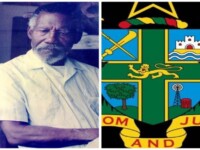
The inspiration behind Ghana’s Coat of Arms designed by Nii Amon Kotei
West African country of Ghana had a good fortune of having Nii Amon Kotei as citizen. He designed the country’s Coat of Arms. Even more spectacular was that Kotei aside being a sculptor was also a painter, musician, teacher, soldier and surveyor.
In later years, Kotei would recount how as Ghana’s Independence day drew near from colonial Britain, on March 6, 1957, the country needed one creative person to design a distinct coat of arms for the state. Kotei, who was then working with the Government Printer was asked to present a sketch for consideration.
“I suggested the use of the Eagle because I had read over and over again of the famous Eagle and the Chick story,” he noted.
His final drawing caught the eye of Cpt. Hamilton, the British liaison officer and Ghana’s first President Osagyefo Dr. Kwame Nkrumah. It was thus approved on March 4, 1957.
The Coat of Arms composed of a shield, divided into four quarters by a St. George’s green cross, rimming with gold which appears on all government official letterheads.
“Kotei was born into a Ga family at La, near Accra on May 24, 1915. He studied under a scholarship at Achimota School later receiving a scholarship to study art at the London School of Printing and Graphic Art from 1949 to 1952. He also fought for the Royal West African Frontier Force during World War II and also worked in the Cartographic Division of the Army. He drew maps and plans for use by soldiers on the war front. Kotei also taught in Achimota School.”
He was awarded the State Honour of Grand Medal, Civil Division, by former Ghanaian president Jerry John Rawlings on Friday, March 7, 1997. He received several other awards.
“The Coat of Arms produced by Amon Kotei has a crossed linguists’ staff and ceremonial sword on a blue background. This is positioned at the top left-hand quarter representing local administration. A heraldic castle on a heraldic sea with a light background also positioned at the top right-hand quarter represents national government.
A cocoa tree at the bottom left-hand quarter depicts the agricultural wealth of the country while a mine shaft located at the bottom right-hand quarter represents the mineral wealth of the country. A gold lion also positioned at the centre of the Green St George’s Cross shows the continuing link between Ghana and the Commonwealth whiles the black five-pointed star rimmed with gold standing on the wreath of red, gold and green colors signifies the lone star of African Freedom. The two eagles signify a protector with strength and attentive eyes keeping watch over the country while Ghana’s motto Freedom and Justice under the shield represents the country’s national aspirations,” according to Development Journalist, Kwaku Boakye Karikari.
Kotei also painted woman figures and clothed them with celestial symbols like halos. He died on October 17, 2011.
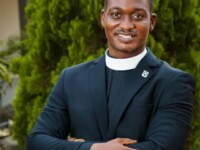
Ayekoo Rev. Carl Henry Clerk.
Many congratulations to Akora Carl Henry Clerk (2004 Year Group) on his Commissioning into the Ordained Ministry as a Reverend Minister in the Presbyterian Church of Ghana, on 30th June, 2020, having completed ministerial formation at the Trinity Theological Seminary, Legon this year.
To God be the Glory!
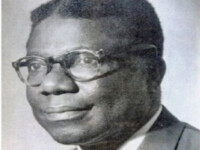
Oku Ampofo, renowned physician and sculptor
Oku Ampofo, renowned physician, a pioneer in the use of herbal medicine and founder of the Centre for Scientific Research into Plant Medicine in Mampong-Akwapim and also He was an actor and sculptor. His sculpture sits in the Africa Room of the Kennedy Center in Washington.
Dr. Oku Ampofo (1908-1998) is a world-acclaimed sculptor and renowned allopathic medical practitioner from Ghana. In fact, the man excelled in both sculptural arts and medical practice so much that it is difficult to place him in one field of his life and leave the other. Another truth about this man is that he was one of Ghana`s foremost Pan-Africanist cultural advocate who was a member of the council put together to ensure the creation of the Institute of African Studies faculty at the University of Ghana. Dr. Oku Ampofo could be described as a man of many parts with his sterling career spanning from Medicine, Sculpture, and Cultural Studies.
Dr. Ampofo was not only a physician, a pioneer in the use of herbal medicine and founder of the Centre for Scientific Research into Plant Medicine but also an actor and sculptor. The Centre for Scientific Research into Plant Medicine (CSRPM), Mampong-Akwapim was established by the Government of Ghana in 1975 as a result of the dream and vision of Dr. Oku Ampofo, a renowned allopathic Medical Practitioner.
In the seminal work “Reclaiming the Human Sciences and Humanities Through African …, Volume 1” edited by Helen Lauer and Kofi Anyidoho, the two authors quoted Professor Kwasi Yankah, the celebrated Ghanaian Linguist about Dr Oku Ampofo’s influence in creation of Center for Scientific Research Into Plant Medicine (CRSPM ) “In 1975 he established the Center for Scientific Research Into Plant Medicine in Mampong Akwapim, which has collaborative links with several reputable scientific institutions and industries worldwide, and which was designated in 1985 by the World Health Organization as a collaborating center for Traditional Medicine- the first in Africa.”
Dr Oku Ampofo started his carved work from African cedar, ebony and an exotic wood called afzelia. Dr Ampofo exhibited in Senegal, Nigeria, England, United States of America, Israel, Brazil, and Romania. He influenced many contemporary Ghanaian artists, painters, sculptors and ceramists alike.
Ampofo as an instigator and innovator in sculptural art produced one of the art best works during his lifetime.
“One of Ampofo’s sculptures, of a native woman mourning in the wake of Kennedy’s assassination in 1964, sits in the Africa Room of the Kennedy Center in Washington,” said Winn, who maintains a foundation in the physician’s honor.
He was born in 1908 at Amenase and was christened Edward Oku Ampofo. His father was a divisional Akuapim chief known as Kwasi Ampofo and his mother was Madam Akua Adwo. He had two brothers one called Nyamekye Ampofo Quashie and another called Kwesi Oku Asamoah.
Dr. Ampofo started his basic school at Anum Presby. After his completion, Ampofo proceeded to prestigious Mfantsipim School in Cape Coast where he had his form 1 to form five education between 1926-1929. From Mfantsipim, Ampofo moved to the prestigious Achimota University College in Accra from 1930 to 1932.
It was at Achimota that Dr. Ampofo met South African, anthropologist, and sculptural art professor, H. V. Meyerowitz who had come to Gold Coast to teach art at Achimota college and whose exertion bestirred and encouraged a whole generation of Ghanaian artists and craftsmen. After his memorable studies in Achimota, Dr. Ampofo earned a scholarship to study medicine at Edinburgh University and Royal College of Edinburgh and Glasgow – 1933-1939. Ampofo who was an exceptionally intelligent student qualified as doctor in 1939 with the diplomas, L.R.C.P. (EDIN), L.R.C.S. (EDIN), L.R.F.P. & S. (GLAS). In 1940 (March to July), he had his Post-Graduate studies in Liverpool School of Tropical Medicine.
Whilst in England Ampofo did not neglect his longstanding love for arts. He made regular visits to museums and attendance at lectures dealing particularly with the Traditional Arts of Africa. When at one time Ampofo`s bursary was canceled and was on the verge of being sent home, he got enrolled as a sculptor in Edinburgh. It was here he concentrated much of his energies until the bursary crisis came to pass and he completed his medical education successfully.
On coming home, Dr. Oku Ampofo established an art studio as well as clinic; moreover, he took an immediate and active interest in the work of others and bent his effort towards their encouragement. His medical practice caused him to travel the length and breadth of the country. This brought him into direct contact with various facets of changing social and economic conditions caused by modernization leading to the end of the traditional way of life.
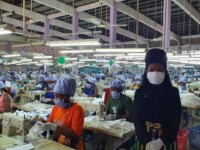
Akora Nora Bannerman Ayeekooo!
It’s not just about earning a good income, but our workers have this deep sense of duty to provide needed PPEs. NB:Food and Drug Authority approve
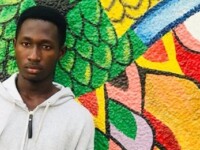
With the increasing number of Coronavirus cases in the country, there has been a joint force by all, in educating Ghanaians on why they have to adhere to all the preventive measures put in place by the government.
Impressive is an understatement when students in Ghana’s Senior High Schools put their creativity to test by coming up with brilliant ideas to help in the fight against COVID-19.
First, was a group of students from the Obuasi Secondary Technical School who designed a hands-free Veronica bucket. The artifact is designed in a way that, once you place your hand beneath the tap, the water automatically flows.
The invention ensures that people are able to wash their hands using water from the Veronica bucket without touching its tap.
Next is a 17-year-old Okyere Louis Arko, a second-year gold track student of the Achimota Senior High School.
The young man created an animation video to educate Ghanaians on the implications as well as dos and don’ts of Coronavirus.
Speaking to GhanaWeb in an exclusive interview, Louis, disclosed the purpose is to reach out to the masses especially the Ghanaian populace who love animation and cartoons, by using what they love to educate them on why they need to adhere to preventive measures.
Not using, any special tools like a laptop, Louis told GhanaWeb, he uses his Samsung phone to create the animations.
Though a science student, his love for IT compelled him to develop the passion by reading and watching a lot of videos on YouTube. He reiterated that he has not taken any professional studies on that.
Hence, he practices what he learns on the web by using his phone.
“I use my phone for all my animations. I used only one hour to create the COVID-19 sensitization video” he told GhanaWeb.
Louis told GhanaWeb, that his family and teachers have been supportive of the new skills he has acquired.
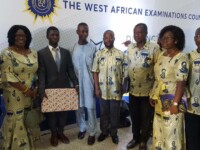
Congratulations to Akora Caleb Smith, Aggrey House (OAA 19), best overall candidate in the General Arts Programme for the West African Senior School Certificate Examination.
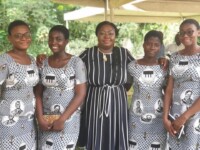
Wherever her story has been told, people have been left in awe. Daughter of a Vulcaniser. Parents with no education. A community where early marriage was expected. How a complete stranger who had never met her paid school fees in advance at Achimota School so she was ‘forced’ to continue her education. Fending for herself and her younger siblings when things became tougher for her dad while she was in secondary school. Shattering betrayals. Sexual harassment. Trading even as she continued her education. Losing all her capital. Entering the corporate world. Rising rapidly in banking to become MD of UBA Ghana and now Regional CEO, West Africa. This incredible story is in Chosen From the Darkness – her memoir. The picture below shows the most celebrated Ghanaian female banker, Mrs. Abiola Bawuah after she recently had shared her story at her Alma Mater, Achimota School.

Achimota Hockey Legends. With the Late President Prof. Atta Mills, former President of Ghana and a hockey legend. Credit Akora Kwesi Quartey, African Union, Vice Chair.cently had shared her story at her Alma Mater, Achimota School.
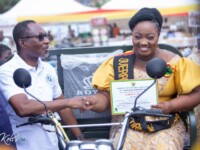
Akora Pamela Agbotse 2003 year group was awarded in 2019 the overall Municpal Best Farmer for Adenta Municipal Assembly .
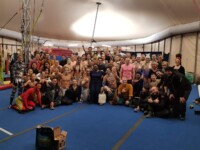
Akora Esi Acquaah-Harrison bows out of Cheque de Soleil after 10years as the lead singer. This role took her around the world. Congratulations Esi Acquaah-Harrison for a job well done.
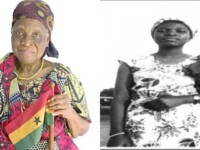
Akora Theodosia Salome Okoh, designer of the Ghana Flag was born Today on June 13, 1922, exactly 98 years ago. She was a Ghanaian stateswoman, sportswoman, teacher, and artist. She served as the first female chairperson of the Ghana Hockey Association.
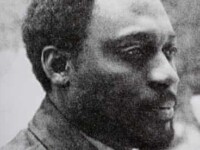
I was 14 when I first read Kofi Awoonor’s novel, This Earth, My Brother. Its wonderfully musical prose, its immersion in Accra’s history, its obvious confidence in its place in the world, made me go to my father and ask about the other uncle.
I grew up with two writer uncles, Frank Kobina Parkes and Kofi Nyidevu Awoonor. Both were devotees of Kwame Nkrumah, Ghana’s first president, yet never let politics affect their personal relationships. I should know; my mother is the niece of General Ankrah – the man installed as leader when Nkrumah was overthrown. Such contradictions are the stuff great stories are made of.
The St Lucian poet Derek Walcott once wrote that tension creates memory and I suspect that is why I have always held Uncle Frank and Uncle Kofi so dear. Yet, I would add to Walcott’s assertion my own; absence creates myth. Frank was a treasured uncle; Kofi was a mythical one. It is almost not strange that a band of terrorists who have created their own mythical code in service to their perception of the message of the absent prophet Muhammad (peace be upon him), were responsible for his departure.
The afternoon of 18 September 2013 at the Nairobi National Museum was my first meeting with Uncle Kofi. At the end of the Storymoja festival press conference, he hugged me: “Your father used to crack me up. I have stories to tell you.” Three days later, I was waiting at the festival to do a poetry reading alongside him – he never turned up. Close to midnight, the Ghana high commissioner in Kenya called to confirm that he had been killed in the Westgate mall attack.
My feeling of personal loss is profound, but, as a literary hero, Kofi Awoonor lives on. Absent heroes are powerful because their legacy is not influenced by them, we are drawn to the elements that resonate and that, ultimately, serve both hero and devotee best. Professor sleep well, we will meet on the other bank of the river.
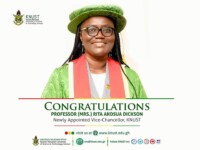
Congratulations to the newly appointed Vice-Chancellor of Kwame Nkrumah University of Science and Technology (KNUST) in Ghana, Prof. Rita Akosua Dickson.
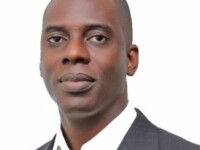
Akora Kofi Dadzie (OAA95) says goodbye to Rancard Solutions
Kofi Dadzie couldn’t have envisaged that his exit from Rancard Solutions would be virtual.
But that’s exactly what it was. After 19 years as CEO, Dadzie’s final goodbye came at the end of a virtual meeting where he passed the baton to Ernest Osei-Owusu, the General Manager. It was the final step of his succession plan.
Dadzie and his co-founder set up Rancard in April 2001, barely a month after Dadzie returned to Ghana from the US. Their vision was to create a world-class software company, solving global problems at scale, out of Africa, and leading the way for African excellence. Friends and family who shared in that vision provided the ‘patient’ equity capital they required.
Dadzie was inspired by the dotcom era he’d witnessed, as a student at Vanderbilt University and as a software engineer at Dell Corporation, when young computer-savvy entrepreneurs rode on the fast growth of the internet to become overnight millionaires.
At the virtual final meeting, the Rancard team paid tribute to Dadzie for his exceptional leadership. They each recounted instances where Dadzie had personally influenced them with his drive, encouragement and support, and noted with deep appreciation his sacrifices and genuine commitment to their welfare.
It must have been an emotional time for Dadzie as he logged off Zoom in his home study, and reflected on the last two decades. In addition to being tearful, Dadzie must have been feeling anxious (about an exciting though uncertain future), elated (about his courage to move on), proud (about how far he’d brought Rancard) and grateful (to God and his family for love and support, particularly during the difficult years).
He must also have been feeling confident. Confident that Rancard would remain a world-class brand solving global problems at scale, out of Africa. Thanks to a combination of the calibre of the team and the hours Dadzie personally invested in both technical and personal development, he is in no doubt that he has left the baby he’d co-conceived, nurtured and developed in great hands.
Dadzie steered Rancard from the brink of insolvency, after it had run out of capital two years into the business. He’s scaled up, scaled down and then scaled up again, each time successfully leading Rancard through the, sometimes fraught, restructuring and resizing process. Dadzie has always reinvented himself and the company, and made Rancard even more relevant to its impressive customer base (in over 25 countries, including the likes of Google and Intel).
Dadzie has attracted difficult-to-obtain private equity from Peninsula Capital (which also invested in the Chinese internet phenomenon Baidu), Intel Capital (the strategic arm of Intel Corporation) and Adlevo Capital (the technology-focused African private equity firm).
More importantly, he leaves a formidable global reputation based on a culture of innovation and a contempt for complacency and mediocrity, as well as a network of mentee staff and alumni who work around the world in global brands like Microsoft and Amazon.
The icing on the cake: Rancard was recently awarded a US technology patent in an emerging field that combines graph technology with artificial intelligence to create solutions that outperform current methods.
In leading and exiting Rancard, Dadzie has led the way for African excellence, displaying behaviours atypical of most African entrepreneurs. Amongst others:
- Dadzie was always clear that Rancard was never about him. It was merely the vehicle to develop solutions to add value to the business of customers.
- He built multi-layered and reinforcing systems and structures that will continue to ensure that Rancard continues to remain a force to be reckoned with.
III. He understood that owning 100% of nothing is a grand zero. He co-founded the business with a friend, and opened up the equity (and therefore the rewards): His stake at start-up has diluted four-fold having brought in private equity, as well as employees through share option schemes.
- He has always ‘focused on the knitting’. The core of Rancard’s businesses has always been software development and providing clients with solutions based on insights. He has refrained from empire building or investing in unrelated sectors that might have taken away his focus from the core business.
- He has led with deep humility and by example; always ‘walking the talk’.
- In parallel with building Rancard, Dadzie invested in himself and his personal development, spending hours on soul searching and introspection, iterative analysis, critical self-evaluation, course correction and candid conversations; which contributed to making him the leader he has become.
Through such soul searching and evaluation, a few years ago, Dadzie decided to put a time frame to his exit, and to plan towards a successful transition. It was at this time he sought me out, to bounce ideas off me, and we ended up having many enjoyable conversations. A few of these lasted several hours, as in our shorts and trainers, we perambulated the sidewalks of East Legon, the suburb in Accra where Dadzie lived with his wife, Afua, and children.
After seeking and obtaining the blessing of his board, he focused on strengthening the skills, capability and capacity of his team, bringing in new hires where he felt necessary. He relinquished the CEO role, becoming Executive Vice-Chairman with the additional role of VP with additional oversight of product management, which took him to his engineering roots, designing software, architecting, and coding of the products.
Constance Chuks said ‘Let the ovation be louder when you leave the stage than when you climbed it” I, along with the business community, give a standing, even if virtual, ovation to Kofi Dadzie.
Dadzie is not, as yet, sure which other stages he might light up. But were he to allow himself a rare and uncharacteristic moment of immodesty, he’d have to agree that the ovation that will accompany his exit from the next stage would be even more rambunctious. And it’s unlikely to be just virtual.
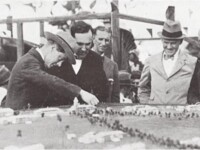
Visit of His Royal Highness The Prince of Wales to the Gold Coast Colony in 1925.
“When the Prince inspected the Model of the College he exclaimed: “Why, he has even put in an anthill.” Behind the Prince are Mr. W.F. Hedges, the Architect, Hedges was Chief Architect in the Public Works Department in the Gold Coast Colony, and was made an Officer of the Order of the British Empire (OBE) and Mr. W. Galloway, the Contractor, while on the right are Vice-Admiral Sir Lionel Halsey and the Rev. A. Fraser.”
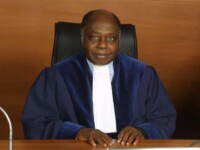
In early 2013, when the Philippines brought an international case against China for violations of its rights under the law of the sea, a five-member arbitral tribunal was selected, with Thomas Mensah appointed as president. With China making extensive claims to resources falling within a “nine-dash line” (the undefined, vaguely located demarcation line used by China but disputed by other countries) across vast swathes of the South China Seas, the case was politically explosive for the whole region and beyond.
Mensah’s appointment reflected the esteem with which he was held, a deep knowledge of the law coupled with a recognition of his pragmatism and principle, and his fearless independent spirit. Three years later, under his guidance, the tribunal rendered a unanimous and far-reaching award, decisively rejecting China’s claim. The decision offered a rare example of judgment free from fear of “great power” retribution.
Mensah, who has died at the age of 87, was the world’s leading judge and arbitrator on the settlement of international maritime disputes. In 1996, when the new international tribunal for the law of the sea (ITLOS) began to function in Hamburg, he was elected as one of its 21 judges, and then chosen by colleagues to serve as the tribunal’s first president. In that role he oversaw the adoption of the rules and procedures that formed the character of the tribunal, and have stood it in good stead ever since.
He spent 19 years at ITLOS, also serving as an arbitrator and, later, as an ad hoc judge at ITLOS and at the international court of justice. The cases he decided were varied. In 2001, when Ireland and Britain disagreed over a proposed new nuclear facility at Sellafield, in Cumbria, Mensah served as president of the tribunal. In a dispute on the delimitation of the Bay of Bengal, as judge ad hoc appointed by Bangladesh, he collaborated with his counterpart, appointed by Myanmar, and produced a joint opinion – a rare act in inter-state litigation by two “opposing” judges. In a dispute between Argentina and Ghana, he confirmed his spirit of independence by joining in a unanimous decision against his own country.
His final case, between Ghana and Ivory Coast, brought particular satisfaction, ending a long-running maritime boundary dispute. These and other decisions reflected his conviction that international courts and tribunals contributed to the public good by ensuring that “international disputes are resolved peacefully, for the benefit of the parties and the international community as a whole”.
Mensah was born in Kumasi, the capital of the Asante kingdom, at a time when it had already become incorporated into Britain’s Gold Coast colony. He attended Achimota school in Accra, at a time of growing nationalist consciousness, and then went to the University of Ghana as the country approached its independence, a formative period in his early life.
In 1959 he obtained a first-class degree in law at the University of London, then headed to Yale Law School in the US, where in 1964 he obtained a doctorate. His thesis, on the right of self-determination for colonies, focused on the role of international institutions, including courts, to achieve this objective. The subject was one of enduring personal interest, one to which he remained committed throughout his life.
From Yale he returned to Accra, to lecture in law at the University of Ghana, serving briefly as dean of the faculty of law. He might have enjoyed a successful academic career but opted instead for public service of a more practical form, in the international domain. In 1968 he returned to London to join the secretariat of the International Maritime Organization (IMO), the UN agency then based in Piccadilly, later on the Albert Embankment. He rose to the position of director of legal affairs and external relations, and assistant secretary general, in 1981. His time there coincided with growing environmental concerns, and he played a formative role in giving birth to a new subject area, the protection of the marine environment, with standards for ships and rules on liability for damage by oil pollution and other sources.
Retirement from the IMO in 1990 opened the door to a new life, based at the family home in London. He lectured and wrote, and in 1995 was appointed Ghana’s first high commissioner to South Africa. Presenting credentials to President Nelson Mandela was a significant moment. The following year he became a judge at the international tribunal for the law of the sea, subsequently being elected as its first president. This was the start of global renown as an international adjudicator.
Anyone who came across Tom sensed his special qualities, the dignity, intelligence and biting humour coupled with a gentle humanity, an interest in the person. With a superbly mischievous twinkle in his eyes, he had no interest in baubles and honours. Much more fun to sneak off to an Arsenal game, or eat with family and friends, or just talk about the state of the world.
Those who appeared before him as counsel appreciated the practical efficacy and intellectual acuity. Those who sat with him recognised his unique ability to forge agreement among disparate colleagues. One of his closest friends, his judicial colleague Judge Rudiger Wolfrum, explained what made it special to judge with him, particularly on the most contentious issues, such as the South China Seas: “Tom could listen, understand, show sympathy,” he told me. “He had his own views, but he never insisted upon them to the exclusion of the views of others.”
He is survived by his wife, Akosua, children, grandchildren and a great-grandson.
- Thomas Aboagye Mensah, international lawyer, born 12 May 1932; died 7 April 2020
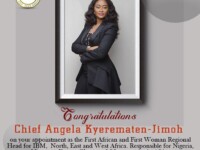
Congratulations to Akora Angela Kyerematen-Jimoh-Kingsley House.
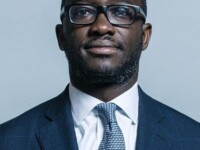
Akora Samuel Phillip Gyimah; born 10 August 1976 is a Conservative Party politician who has served as the Member of Parliament (MP) for East Surrey since the 2010 general election.
In July 2014, after serving as Parliamentary Private Secretary to the Prime Minister and a government whip, Gyimah was appointed Parliamentary Under-Secretary of State for Childcare and Education, as well as Parliamentary Under-Secretary of State with particular focus upon the constitution.
Following the general election in May 2015, Gyimah was reappointed to the education brief.
Gyimah was born in Beaconsfield, Buckinghamshire. When he was six years old, his parents split up and his mother returned to her native Ghana with Gyimah and his younger brother and sister while his father remained in the UK.
For the next ten years, Gyimah attended Achimota School, a prestigious school notable for educating five former Presidents, before returning to the UK to sit GCSEs and A-levels at Freman College, a state school in Buntingford, Hertfordshire.
He then went on to Somerville College at the University of Oxford, where he read Politics, Philosophy and Economics, and where he was elected President of the Oxford Union.
On graduation, Gyimah joined Goldman Sachs as an investment banker, leaving the company in 2003 to set up Clearstone Training and Recruitment Limited with fellow Conservative MP Chris Philp. Clearstone and its subsidiaries went into administration in 2007.
In September 2005 Gyimah edited a report by the Bow Group, a Conservative think tank, entitled From the Ashes: the future of the Conservative Party. He was subsequently elected chairman of the Bow Group from 2006 to 2007.
Gyimah stood unsuccessfully for election in Kilburn ward in the Camden Council election, 2006.[10] In December 2009, Gyimah placed third in the Gosport primary election to succeed Peter Viggers, losing to Caroline Dinenage.
Following his appointment to the Conservative Party A-List, he was elected as the MP for East Surrey at the 2010 general election, Gyimah made his maiden speech on 29 July 2010.
Gyimah has previously been a member of the International Development Select Committee, having stated an interest in harnessing the private sector towards achieving international development goals.
Gyimah has also been active in debates on education and employment, as well as a number of local campaigns to protect the greenbelt in Surrey.
In 2011, Gyimah produced a report with think-tank NESTA, “Beyond the Banks”, in support of non-bank alternatives for businesses seeking finance. He was the first MP to call for credit easing as a means of accelerating Britain’s economic recovery.
Gyimah was appointed as a Government Whip in October 2013, having previously been Parliamentary Private Secretary (PPS) to the Prime Minister since the 2012 reshuffle.]
Gyimah supported the UK remaining in the European Union in the 2016 EU referendum.
On 20 November 2015, Gyimah contributed to the filibustering of the opposition-proposed Compulsory Emergency First Aid Education (State-Funded Secondary Schools) Bill to make the teaching of first aid in secondary schools compulsory.
He spoke until the end of the debate, despite requests from the deputy speaker.
On 21 October 2016, Gyimah filibustered the Sexual Offences (Pardons) bill (nicknamed the “Turing Bill” after Alan Turing), a private member’s bill presented by Scottish National Party MP John Nicolson that would pardon all men convicted of abolished offences related to having same-sex relationships; subsequently, he was accused of “reinforc[ing] the age-old homophobic stereotypes of gay men as predatory and/or pedophiles” by having stated that the bill did not give enough safeguards to prevent men being accidentally pardoned for sex with a minor or non-consensual sex.
Supporters of the bill disputed this as conditions for a pardon included the act being consensual and that it would not break modern British law. He was met with calls of “shame” toward the end of his speech.
He instead supported an amendment proposed by the government to existing legislation, in which only dead men convicted of such offences were automatically pardoned while those who were living would have to apply through the Home Office through a “disregard” process.
Gyimah is married to Dr Nicky Black, a New Zealander with whom he has a son and a daughter.
Gyimah has been a volunteer and fundraiser for Crisis, the Down’s Syndrome Association and St. Catherine’s Hospice in Surrey.
He has served as school governor of an inner London school, on the board of a housing association and on the development board of Somerville College.
He is a Vice-President of the Young Epilepsy charity (formerly the National Centre for Young People with Epilepsy (NCYPE) in Lingfield.
